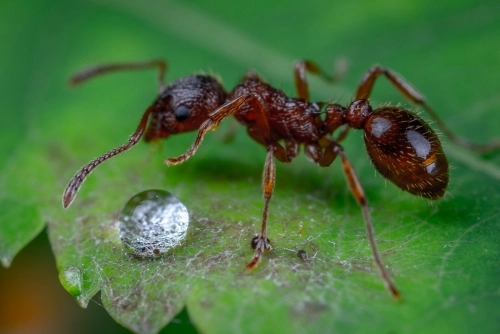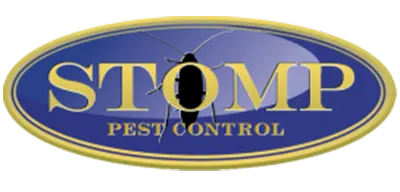When it comes to ants invading your home, knowing exactly what kind of intruder you’re dealing with can help you know how to get rid of them more quickly and efficiently. In North Carolina, we have quite a few ant species that tend to pop up a bit more often than others. Join our Raleigh-based pest control technicians as they share the various types of North Carolina ants.
Argentine Ants
Argentine ants are among the smallest of North Carolina ants, measuring around 1/16 to 1/8 inch in length. They typically display a uniform light to dark brown color, which helps them go unnoticed, sometimes even when they appear in larger numbers.
Argentine ants are characterized by their cooperative behavior. They are known to form trails, allowing for efficient foraging between their nests and food sources. Their adaptability and ability to dominate other ant species make them a challenging pest to control.
That adaptability and cooperation help them form vast supercolonies with multiple queens. They prefer nesting in moist soil and are commonly found in gardens, alongside buildings, and in vegetation. Their nesting sites can extend over considerable areas, contributing to their status as formidable invasive pests.
Odorous House Ants
Odorous house ants are small ants, ranging from 1/16 to 1/8 inch in length. They are typically dark brown to black in color, making them hard to differentiate from the Argentine ant. One distinctive feature that sets them apart is the unpleasant odor they emit when crushed, often described as a rotten coconut or blue cheese smell.
These ants commonly nest indoors, making them a frequent household pest. They nest in wall voids, beneath floors, and in other concealed spaces. Odorous house ants are opportunistic and often take advantage of pre-existing cavities in structures.
When they do get inside, they are known for their foraging behavior, seeking out sugary and protein-rich foods. Their scavenging trails can extend over significant distances, making them persistent invaders of homes.
Carpenter Ants
Carpenter ants are notably larger than many other North Carolina ants, with sizes ranging from 1/4 to 1/2 inch. They can be black or reddish-brown, and distinguishing features include a well-defined waist and elbowed antennae. These creatures are primarily nocturnal foragers, and their diet consists of insects and sweet substances.
Unlike destructive termites, carpenter ants do not consume wood. Instead, they excavate it for nesting, establishing nests in decaying or water-damaged wood. Common nesting sites include structural wood, tree limbs, and wooden debris. Though they don’t eat the wood, their ability to damage wooden structures makes them a concern for homeowners.
Fire Ants
Fire ants vary in size, ranging from 1/8 to 3/8 inch, with a reddish-brown to black coloration. They are known for their aggressive behavior and distinctive mounds, which they tend to construct in open areas such as lawns, gardens, and fields. The mounds serve as their nests, and colonies can grow to significant sizes. They are resilient and can adapt to various environments.

Fire ants are territorial and notorious for their painful stings, which can cause allergic reactions in some individuals. They aggressively defend their nests and forage for food.
Pavement Ants
Pavement ants are small, measuring around 1/8 inch in length. They are typically dark brown to black and have distinctive grooves on their head and thorax. Pavement ants commonly nest in and around human structures. As their name suggests, they construct nests beneath pavement cracks, alongside curbs, and under stones, choosing locations close to food sources.
They are opportunistic feeders, consuming a variety of foods. These North Carolina ants are known to enter buildings in search of sweets, greasy substances, and other food items.
Pest Control Tips: Dealing with North Carolina Ants
Whether you’re facing the invasion of Argentine ants, odorous house ants, carpenter ants, fire ants, or pavement ants, taking swift and strategic action is the only thing that will help you reclaim your living space from North Carolina ants.
Identification and Assessment
Identifying the ant species causing the infestation is the first step in effective control. Different species may require specific strategies. Take note of their size, color, nesting habits, and foraging patterns, all of which can help you tailor your approach to the unique characteristics of the invading ants.
Sanitation and Prevention
Maintaining a clean and sanitary environment is helpful when it comes to preventing ants. Regularly clean kitchen surfaces, store food in sealed containers and promptly fix leaks to eliminate water sources. Seal cracks and crevices in walls, windows, and doors to prevent ants from entering.
DIY Treatment Methods
Several do-it-yourself (DIY) treatments can help manage ant infestations. Use ant baits strategically placed near foraging trails, as ants carry the bait back to the colony. Insecticidal sprays and dusts can be applied to ant entry points, disrupting their pathways and nests.
Natural Remedies
Consider using natural remedies to deter ants. Cinnamon, vinegar, and peppermint oil are known to repel ants. Sprinkle these substances along ant trails and potential entry points. Diatomaceous earth can be effective in disrupting ant colonies by causing dehydration.
Professional Pest Control
If the infestation persists or is overwhelming, seeking professional pest control services might be best. Pest control experts have the knowledge, experience, and access to specialized treatments necessary for effective ant eradication. They can conduct a thorough inspection, identify the root cause of the infestation, and implement targeted strategies.
When to Contact a Pest Control Company for North Carolina Ants
There are a few instances that indicate the need for a pest control company to address your ant infestation, including:
- Stubborn infestations: If your DIY efforts have not yielded significant results and the infestation persists.
- Large or Multiple Colonies: Ant colonies can be extensive. Professional pest control can address large or multiple colonies simultaneously.
- Damage: If carpenter ants are causing structural damage to wood in your home, seeking professional intervention is crucial.
- Health and Safety Concerns: Certain ant species, like fire ants, pose health risks due to their aggressive nature and painful stings. Professional help is recommended to mitigate these risks.
How to Choose a Pest Control Company for North Carolina Ants
When selecting a pest control company to tackle your ant infestation, the first thing you should prioritize is their experience. Look for companies with a demonstrated and proven track record specifically in ant control. Experience speaks to their familiarity with the behaviors, nesting habits, and effective treatments for different ant species.
Do some research to be sure they are licensed and certified to handle pest control. Proper certifications demonstrate that the company adheres to industry standards and possesses the necessary expertise to employ safe and effective pest control methods.
Look for companies, such as Stomp Pest Control, that prioritize Integrated Pest Management (IPM) strategies. IPM focuses on a holistic and sustainable approach to pest control, emphasizing long-term prevention rather than just immediate eradication. This method considers environmental factors, pest biology, and the specific conditions of your property to develop a customized and effective plan.
Contact Stomp Pest Control to Eradicate North Carolina Ants
By staying informed about the types of ants prevalent in North Carolina and their nesting habits, you can make the right call when it comes to pest control.
For effective prevention or elimination of North Carolina ants, call Stomp Pest Control! Our services cater to both residential and commercial properties in the Triangle area, effectively eradicating carpenter ants, fire ants, and more. On top of our comprehensive extermination offerings, we provide budget-friendly pest control programs that come with a 100% satisfaction guarantee. To get started with a pet and child-friendly pest control plan for as low as $25 per month, contact Stomp Pest Control by phone at (919) 231-3292 or fill out the form below.
Packages
We would love to hear from you! Please fill out this form and we will get back to you shortly.

